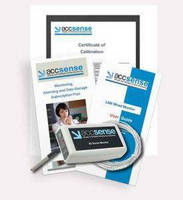Vaccine Safety: What's It Worth?

Warning to Clinics--Children Given Defective Vaccines in 2011!
CHESTERLAND OH — As reported by Fox 8 News in late March of this year, a pediatric clinic in Ohio experienced a temperature excursion in a vaccine fridge that resulted in the loss of $60,000 worth of vaccine. But that's not the worst part of this story. Because the temperature excursion took place overnight, the damage to the vaccine was not discovered until three months later during an audit of the temperature logs. Efforts to locate and revaccinate the affected children are still underway. Here's the story, complete with video: http://fox8.com/2014/03/27/clinic-warning-children-given-defective-vaccines-in-2011/. This incident could have been avoided entirely if a remote monitoring and alarming system had been in place. The Accsense Vaccine Storage Temperature Monitoring Kit costs less than $1000, complete with a NIST-traceable certificate of calibration, all hardware, and a one-year monitoring subscription. Subsequent subscription costs are only $69.00 annually for data storage, remote monitoring, and alarm notification via telephone voice messaging, email, and SMS texts. Now your clinic or hospital can have peace of mind with Accsense!
Dr. John Sanderson, the pediatrician at Kidz First Pediatrics in Oberlin Ohio, says the vaccines have been spoiled from October 2011 to December 2011. As quoted in the Fox 8 article, Dr. Sanderson explained, "The way we take temperatures is twice a day, morning and night. When the person came in and took the temperature, the temperature was too cold. And so they adjusted the thermostat. However, they should have notified me, but I was never told."
The federal Vaccines for Children (VFC) program requires that providers must follow CDC vaccine storage and handling guidelines. The recording requirements for monitoring refrigerator temperatures, however, are somewhat loose. Clinics are required to record the refrigerator temperature only twice per day, once in the morning and once in the evening. Because of this, data loggers are recommended--and often supplied by the states—for more frequent logging of temperatures and to provide a visual alarm when storage units go outside safe temperatures.
However, because price rules the decision-making process, the data loggers used in VFC programs are literally the cheapest devices that money can buy. If you do a quick survey of the loggers recommended or provided by various state VFC programs you'll see that:
• They log data, but can't relay it over a network. Staff have no way of gaining access to their critical temperature information short of physically plugging the logger into a PC.
• They often have such a low accuracy that they threaten product safety (their total uncertainty may be as high as +/- 3 degrees C for thermocouple-equipped devices).
• The only alarm indicating an out-of-range condition is a tiny flashing red LED on the device. If the user arrives on-site and the LED is already flashing, it's probably already too late to save the products inside the refrigerator!
• The loggers have no connectivity, and therefore cannot provide voice messaging, emails or texts to users in the event of a problem during off-hours. Staff may come in on Monday to find that all their inventory has been lost over the weekend.
Given that most VFC refrigerators contain vaccines valued at $30,000 to $60,000, isn't Accsense a low price to pay for peace of mind?
Accsense Ethernet Temperature Data Loggers measure and record temperature data at high accuracy by connecting to medical refrigerators and freezers with inputs for 2 RTDs and a Type T thermocouple to measure temperatures from -199°C to 400°C. The pods' trouble-free operation means no expensive training sessions—staff just plug them in and let them run. Users can also login through any Web browser to view reports and graphs of their data or configure the system from anywhere Internet connection is available.
As one of the largest data logger distributors in North America, CAS DataLoggers has provided Accsense temperature monitoring systems for many of the world's most distinguished medical and academic institutions including Stanford Hospital and Clinics, Boston Children's Hospital, the Cleveland Clinic Foundation, and Children's Hospital Los Angeles, among many others.
For more information on the Accsense Vaccine Storage Temperature Monitoring Kit, additional Accsense wired and wireless monitoring systems, or to find the ideal solution for your application-specific needs, contact a CAS Data Logger Applications Specialist at (800) 956-4437 or visit the website at www.DataLoggerInc.com.
Contact Information:
CAS DataLoggers, Inc.
12628 Chillicothe Road
Chesterland, Ohio 44026
(440) 729-2570
(800) 956-4437
sales@dataloggerinc.com
www.dataloggerinc.com




